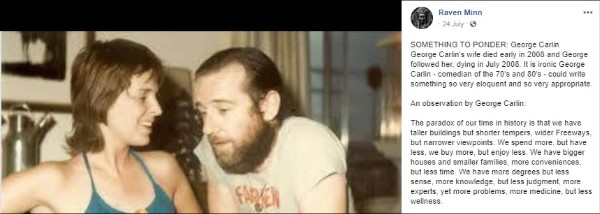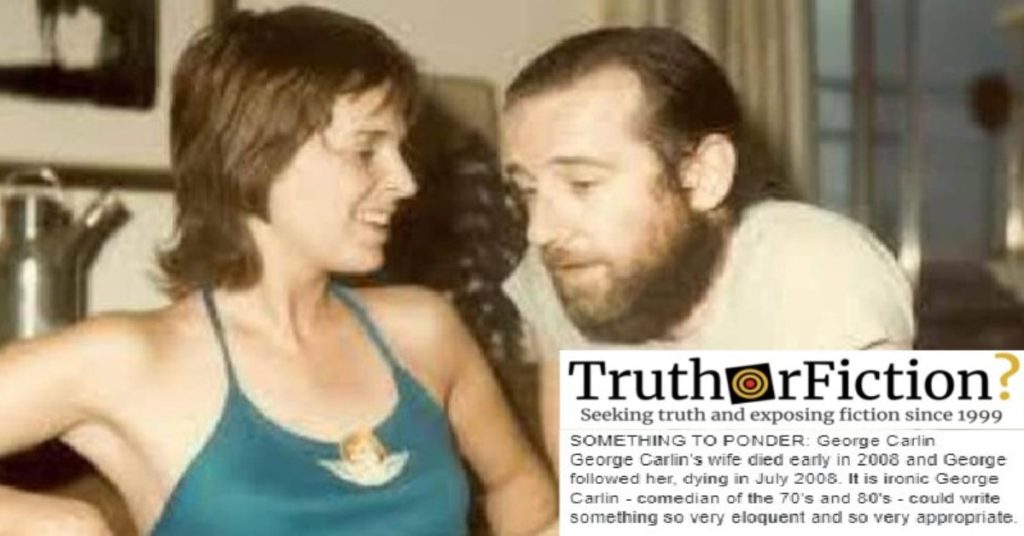An essay that has spent years mistakenly attributed to comedian George Carlin circulates in perpetuity in a popular “copypasta” post shared via email and on Facebook posts.
The essay, “The Paradox of Our Age” (which has also been called “The Paradox of Our Time”), has been framed as a message from the comedian about the prevailing mood within the United Sates after the terrorist attacks against the country on September 11 2001. A newer variation insinuates that Carlin “wrote” the piece in response to the death of his wife:
George Carlin’s wife died early in 2008 and George followed her, dying in July 2008. It is ironic George Carlin – comedian of the 70’s and 80’s – could write something so very eloquent and so very appropriate.

This claim — like the claim that Carlin wrote the essay — is false. Carlin’s first wife, Brenda Hosbrook, died in May 1997. Carlin himself died on June 22 2008 and was survived by his second wife, Sally Wade. He was 71.
Other variations of the lengthy post have claimed that the essay was written by a student who survived the 1999 mass shooting attack at Columbine High School in Colorado. It reads in part:
The paradox of our time in history is that we have taller buildings, but shorter tempers; wider freeways, but narrower viewpoints. We spend more, but have less; we buy more but enjoy it less. We have bigger houses and smaller families; more conveniences, but less time; we have more degrees, but less sense; more knowledge,but less judgment; more experts, but more problems; more medicine, but less wellness.
We drink too much, smoke too much, spend too recklessly, laugh too little, drive too fast, get too angry too quickly, stay up too late, get up too tired, read too seldom, watch TV too much, and pray too seldom.
We have multiplied our possessions, but reduced our values. We talk too much, love too seldom, and hate too often. We’ve learned how to make a living, but not a life; we’ve added years to life, not life to years.
In reality, the comedian did not write the essay and was not a fan of it, calling it a “sappy load of shit” on his website.
“Another problem I have with ‘Paradox’ is that the ideas are all expressed in a sort of pseudo-spiritual, New-Age-y, ‘Gee-whiz-can’t-we-do-better-than-this’ tone of voice. It’s not only bad prose and poetry, it’s weak philosophy. I hope I never sound like that,” he wrote:
Here’s a rule of thumb, folks: Nothing you see on the Internet is mine unless it came from one of my albums, books, HBO shows, or appeared on my website. If you see something with my name on it, and you really need to find out if it’s mine, post a question on my bulletin board. But only if it’s really important to you; don’t fuck around with me for a lark.
The spread of the essay dates back to around 1999; at one time it was attributed to Jeff Dickson of the “Hacks R Us” online forum. But it was actually written by the Rev. Bob Moorehead, the former pastor for Overlake Christian Church in Redmond, Washington. It was published in 1995 in Words Aptly Spoken, a collection of his work.
Moorehead became the church’s senior pastor in 1970 and oversaw a period of radical growth for the church, as its congregation went from 75 parishioners to attracting more than 6,000 people to his services. However, he resigned in 1998 after being accused by at least seventeen men of molesting them when they were younger prior to functions he performed throughout the 1970s.
An investigation carried out by church elders initially cleared Moorehead of wrongdoing. But in May 1999, the Seattle Times reported that the group reversed course, determining that based on new information obtained by a separate committee that Moorehead “did violate the scriptural standards of trust, self-control, purity and godly character required for the office of elder and pastor.” Moorehead denied any wrongdoing.
Update August 10, 2020, 11:17 a.m. pst: This article has been revamped and updated. You can review the original here. — AG

